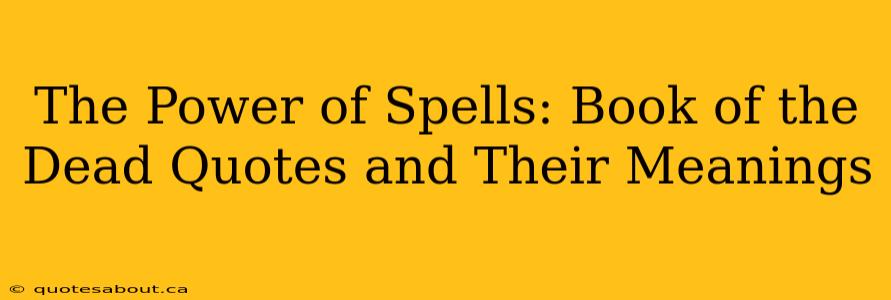The ancient Egyptian Book of the Dead isn't a single book, but rather a collection of funerary texts compiled over centuries. These texts, inscribed on papyrus scrolls and placed in tombs, aimed to guide the deceased through the perilous journey to the afterlife. Central to these texts are powerful spells, incantations believed to ensure a successful transition and a blissful existence in the realm of the gods. This exploration delves into several key quotes from the Book of the Dead, examining their meanings and the enduring power they hold.
What are the main spells in the Book of the Dead?
The Book of the Dead isn't structured like a modern book with a clear narrative. Instead, it's a compilation of spells and prayers, often customized for each individual. However, certain spells appear frequently, reflecting common anxieties and aspirations of the ancient Egyptians concerning the afterlife. Some of the most prominent include:
-
The Chapters of Coming Forth by Day: This is arguably the most important section, a collection of spells designed to help the deceased navigate the underworld and be reborn. It covers everything from protecting the body from decay to appeasing dangerous deities.
-
Spells for Protection and Transformation: Many spells focused on protecting the deceased from harm, both physical and spiritual. Others aimed to transform the deceased into a divine being, capable of enjoying eternity.
-
Spells for Obtaining Food and Drink: The afterlife was envisioned as a place where sustenance was still needed. Spells ensured the deceased had access to food, drink, and the necessities of life in the next world.
-
Spells for Judgment and Justification: The deceased faced judgment before Osiris, the god of the underworld. Spells helped them navigate this process, confessing their sins and proving their worthiness to enter the afterlife.
What is the significance of the "negative confession" in the Book of the Dead?
The "negative confession" is a crucial part of the Book of the Dead, featured prominently in the judgment scene before Osiris. It's not a list of boasts or accomplishments but rather a declaration of not having committed various sins. For example, a common phrase is: "I have not stolen." The significance lies in its emphasis on ethical conduct in life, demonstrating that a virtuous life was essential for a successful passage into the afterlife. This highlights the ancient Egyptian belief in the importance of morality and justice, even extending beyond death.
How did the spells in the Book of the Dead work?
The ancient Egyptians believed the spells were not mere words but potent forces capable of affecting reality. The recitation of these spells, often accompanied by specific rituals and offerings, was seen as a way to interact with the divine and manipulate the forces of the afterlife. The very act of writing the spells on papyrus, often with intricate illustrations, was considered a powerful act of creation. They believed the written word held magical properties, literally shaping the deceased's destiny.
What does the Book of the Dead reveal about ancient Egyptian beliefs?
The Book of the Dead offers invaluable insight into the religious beliefs and worldview of ancient Egypt. It reveals:
- Belief in the afterlife: The central theme is the journey to and existence in the afterlife, a critical aspect of ancient Egyptian faith.
- Importance of morality: The "negative confession" demonstrates a strong emphasis on ethical behavior and justice.
- Power of language and ritual: Spells and rituals were not mere symbolic gestures but powerful actions capable of shaping reality.
- Complex cosmology: The Book of the Dead depicts a detailed and complex cosmology, including various deities, realms, and dangers associated with the afterlife.
Are the spells in the Book of the Dead still relevant today?
While the spells themselves may not be directly actionable today in a literal magical sense, the underlying principles remain relevant. The emphasis on ethical conduct, preparation for the unknown, and the power of belief continue to resonate. The Book of the Dead offers a timeless exploration of humanity's enduring concerns with death, mortality, and the search for meaning beyond the earthly realm. Its power lies not just in its ancient spells, but in the profound reflections on life, death, and the human spirit it inspires.

